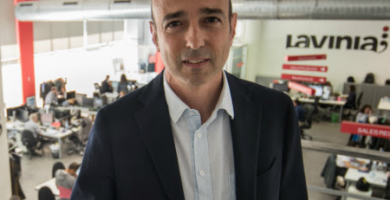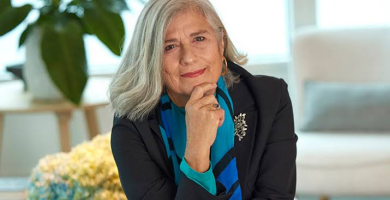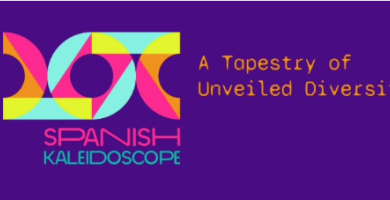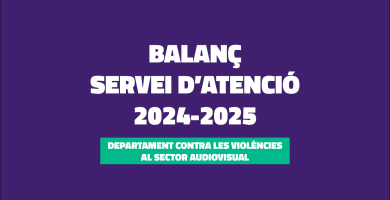
MIQUEL RUTLLANT: “Our objective covers everything that the Cluster can do to help companies, and therefore the sector, to transform and adapt to the new ways of consuming audiovisual”.
We interview Miquel Rutllant, the new Chairman of the Catalan Audiovisual Cluster and Director General of Lavinia, just when he comes out of the first meeting of the association in which he participates as Chairman.

The Audiovisual Cluster was formed in 2013. Why was it created and what does it consist of?
The Cluster was created at a time with a certain amount of concern in the sector when cutbacks were being considered in TV3 and in the corporation. There was a certain unease which enabled all the players from the sector to come together and begin to talk. There wasn’t any association to try to defend the interests across the whole sector. There was a desire to form a more cross-cutting association, because until then there were only associations of producers. The audiovisual value chain is much broader than that, with all kinds of companies such as tech companies, audiovisual service companies, etc. That first meeting, which was held for another reason, ended up leading to the formation of the Cluster. Xavier Guitart, who was the first Chairman, played a very important role on bringing all the elements together.
The Cluster seeks to help the entire sector. I insist that it must be the whole sector; the approach is cross-cutting. It seeks to help companies to internationalize, to adopt new technologies, to collaborate on new projects, to make the transformation from a more conventional audiovisual model - such as the one that existed until now - to a model in which new players appear. We need to liaise with our contacts in the Catalan, Spanish and European authorities so that they can help us to implement this internationalization and modernization. We must, of course, defend the interests of the sector. This is one of the reasons for the existence of the Cluster, with everything entailed in the complexity of representing all the players.
In relation to this, one of the cluster’s aims is to cooperate in a competitive manner. Is it difficult to find synergies when you want to be competitive?
It is difficult, but it is also surprising to see how, in these years of existence of the Cluster and in the different meetings, everyone has managed to be generous on making contributions which benefit the sector. All of our companies which participate in the events and meetings go out and obviously compete against each other, because many of us are devoted to the same thing. It is, however, surprising how, in these almost five years of existence, many things have been achieved. The cooperation has been very positive right from the outset.
As you were saying earlier, people think of audiovisual and they imagine television and film, but there is much more behind this. Such as virtual reality, digital platforms, video games, multimedia, etc. What kinds of company are there in the Cluster?
It is true that the initial core was very traditional, but for years now all the new partners joining come from these new specialities or market segments. At this first meeting of the board, we announced the new partners who were joining and they were all technological: virtual reality, augmented reality, etc. There are more and more partners who end up representing the whole sector and I think that this makes the Cluster much richer because we do not just represent part of the sector and we are increasingly cross-cutting. We are now approximately 80 partners and we have set the objective of increasing the number in two or three years. According to studies, the sector has over 1,500 companies, and it is therefore still under-represented. We should be at least two or three times more than what we are now.
With this evolution in the audiovisual world, digital and new technologies are increasingly important. This is represented in some of your activities, such as the Digital & Media Forum.
Our main event is the Talent Week. We then have a well-established event which has existed for four or five years, which is Zoom Brands, and which is also becoming bigger and bigger. There is also a whole series of all kinds of initiatives in very specific and vertical sectors. They range from collaborations with advertising festivals to agreements with the Mobile World Capital or with different institutions. One of the things that we want to encourage is for the whole sector to know these new initiatives and to collaborate.
What you mentioned about Zoom Brands is also related to the idea that audiovisual is just film and television. Although a large part of the shootings, for example, are for advertising. What does this event consist of?
Brands are an audiovisual form which is growing a lot; the traditional sector is becoming smaller, but the brands/companies sphere is growing fast, as you mentioned in relation to shootings. In Zoom Brands, speakers from several companies specialized in the world of brands (not necessarily from the audiovisual industry; they may come from agencies, producers, technology companies, etc.) explain their experience in relation to the new ways of making audiovisual for brands. It was very successful; it is one of the Cluster’s flagship events and shows that things are being done well.
The Cluster also focuses attention on audiovisual talent and it therefore has a connection with universities, channelled through the Audiovisual Talent Week. What does this consist of, how did it begin and how is this young talent connected with companies?
For me this is the main event of the Cluster. The Catalan universities participate and students have the opportunity to discover the industry and present their projects, which are then assessed. People from the sector moreover say that the projects presented are better and better. We bring together universities and studios, and therefore talent and industry. It is useful for the companies to attract new talent and to obtain fresh and more dynamic ideas. Internationalization is the other major success that it is experiencing. More international industry is attending. The aim is to bring the industry and talent from here into contact. I believe that this has been achieved and now the challenge is to transform it into an internationally renowned event. For it to bring not just the Catalan, but also the European industry, into contact with all the talent that we have here. We have people who are very well-trained and outside it is well-known that the people from here are very good. In the end the Cluster does not just represent companies, but rather any player from the sector. It is not an association of companies, but rather there are institutions, groups of professionals and anyone who has a presence in the audiovisual sector. In this respect, we encourage the development of everyone. This is a key event and is already a brand in itself.
It wasn’t created that long ago, was it?
No, it began with some initial pitchings and it has gradually grown. We also now have the market of professionals. Apart from presenting the projects, we also do a lot of work bringing professionals into contact with companies. The key to success is to collaborate a great deal with the universities and audiovisual and film schools. For me this is the major event; it is worthwhile for the Cluster to exist just for the Talent Week.
Another branch of the Cluster is its connection with the economic and institutional sector. How is this connection organized?
First, as a Cluster, we have several lines of collaboration with the institutions. In this respect, we collaborate a lot with organizations such as Acció, which are helping us with all the internationalization processes and to prepare a strategic plan. There is a collaboration which is more work-related to help the Cluster members to develop with a view to the future. And there are also the institutional contacts to explain the Cluster’s objectives to the leaders of the different governments with which we have relations. Above all, there are contacts to explain the importance of the audiovisual sector as a strategic, creative and cultural sector here in Catalonia. In this respect, a great deal of work has been done by all the members of the board and maybe embodied in the figure of the chairman and vice-chairmen of the Cluster with all these institutions: the Generalitat, Ministry of Culture, etc.
In the news on your election, it was said that with the new chairmanship you wanted to strive to strengthen the international side of the Cluster. What steps need to be taken to achieve this internationalization?
Internationalization is essential. The sector is changing and apart from being able to provide services to the new sectors such as brands, audiovisual training, video games and audiovisual technology, etc., as companies we must be capable of collaborating in order to branch out abroad. How do we do this? Basically, through the Cluster Manager, a whole series of visits are undertaken to other Clusters. For example, last year in Slovenia. Also, helped by institutions such as Acció, visits are organized by other Clusters here or by television channels or institutions from other countries which may be interested, both in the talent from here and in what the companies are doing. We also think that business missions are very important. Some had been made to Israel, for example. Business missions are a way of beginning to discover the country, to see how it is organized from an audiovisual viewpoint and to try to identify opportunities. I believe that all the companies are now much more aware of the importance of internationalization. In the end, the problem is that it is a steep climb. It is very difficult - and not just financially -, a very important effort needs to be made, the results are long term, you have to work a great deal and, therefore, the more you facilitate this work the better it is.
Another idea that we are considering is for the different partners of the Cluster to be able to explain their experiences of internationalization. Apart from this competition that we mentioned at the beginning, I believe that many companies from the Cluster have experiences of internationalization, because there are more than what we thought. There are success stories, cases of failure and experiences to explain. We’re thinking about organizing conferences in which several companies can describe these business cases to us, explaining who they are, what they do and why they made the decision to internationalize. This is very expensive and a much more difficult process than what people think. As regards competition, if the sector grows, it grows for everyone. If in Catalonia we manage to get the companies which are in the Cluster to grow, everything will be reinforced and it will be a focus of attention for all kinds of investment by third parties. Everything is interconnected. I believe that all the partners of the Cluster have understood this very well. You never encounter any reluctance because you know that, in some way, it will benefit everyone.
Not long ago you visited the Parc Audiovisual de Catalunya in Terrassa. Why did you begin these visits?
In the Cluster, we have a team which is very curious and eager to do things. The Cluster Manager is a key figure. Eduard Gil has broad experience in the sector and has clearly understood the function of the Cluster. He and his team are undertaking many activities, almost too many. They are continuously planning presentations by companies, and this led to the idea of visiting the Parc Audiovisual de Catalunya, taking advantage of the fact that they were filming OT. One company from the Cluster, which is called Gen-Lock and which has experience in filming with drones, made a presentation. At the same time, a specialist explained the legal framework. A drone company presented its models. The initiative turned out very well, and we organized the coach which was full. There was even overbooking. This demonstrates that the Cluster works and that its members are using it.
We normally talk about big companies, but is there space for smaller companies?
There are many. It is true that the most well-known are the big ones, but there is plenty of space for them. There are moreover fundamental. The association is essential for the future of the sector. In the end, no company, however big it is, knows how to do everything. Therefore, at one time or another, they have to end up forming partnerships, reaching agreements with other companies. Many of these smaller companies are very dynamic and highly specialized in their area, and they can find an environment of collaboration with companies of the same size or bigger.
Apart from internationalization, what other challenges does the Cluster face in the future?
The main challenge is the transformation of the sector. It is changing, and it is always very difficult for companies to make changes. Our objective covers everything that the Cluster can do to help companies - and therefore the sector - to transform and adapt to the new ways of consuming audiovisual, all the actions that go in this direction. We would like to help all companies, first to understand what these changes are, to give them tools to adapt to the changes, to encourage this collaboration and to provide tools for internationalization. Basically, to help them to compete in a sector which is new and global and which is changing very quickly. You have to adapt to the pace of change. This involves many conferences, a lot of information, a great deal of sharing ideas, a large amount of contact with the industry from different countries, looking closely at what the Clusters and companies abroad are doing, because in the end, in one way or another, the same thing is happening everywhere.









